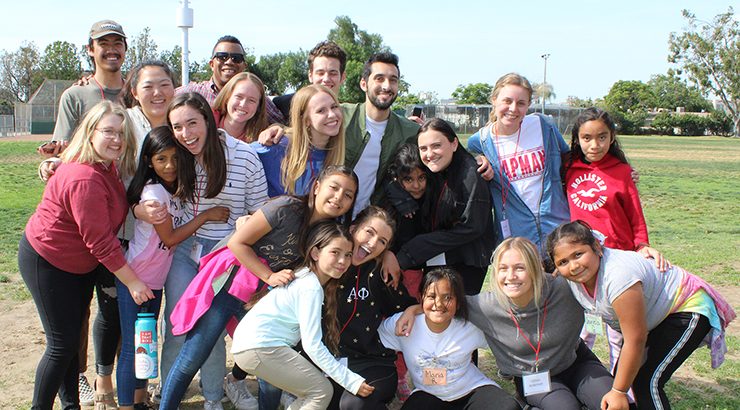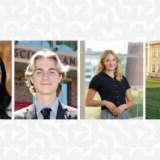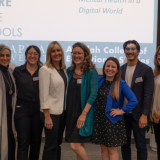
Learning in Context Experiential Course Includes Hands-On Fieldwork with Local Youth
May 9, 2019
 The first time he walked into a room of school kids last February, Chapman sophomore biology major and IES (Integrated Educational Studies) minor Noah Mayne didn’t know what to expect. The aspiring high school biology teacher had little experience with elementary school kids before enrolling in the Attallah College of Educational Studies IES 206: Schools in Society at Higher Ground course.
The first time he walked into a room of school kids last February, Chapman sophomore biology major and IES (Integrated Educational Studies) minor Noah Mayne didn’t know what to expect. The aspiring high school biology teacher had little experience with elementary school kids before enrolling in the Attallah College of Educational Studies IES 206: Schools in Society at Higher Ground course.
The semester-long IES 206 course takes place at Higher Ground Youth & Family Services, a local nonprofit based in Anaheim that provides after-school programming and mentoring for youth and their families in at-risk communities. IES 206 Professor Quaylan Allen, Ph.D., believes running the course within the community in partnership with the after-school program, outside of the traditional college classroom, helps bring the coursework to life, especially for Chapman students like Mayne interested in teaching careers.
IES 206 is part of a larger set of experiential Chapman humanities, film, and education courses held at Higher Ground. Since 2016, Chapman has offered numerous courses in which students and faculty provide the kids in the after-school program with enrichment activities. Holding the courses at Higher Ground helps highlight the interconnections between schools and their surrounding communities, said Dr. Allen, showing in real time how learning happens within a larger context.
“Aside from a couple volunteer occasions, I can’t remember working with a class of students,” Mayne said. “Each time we came back, I felt the kids were more comfortable with us. That’s unique, different from any other college class I’ve taken.”
Integrated Fieldwork
During the semester, the IES 206 students helped the Higher Ground kids with homework and offered one-on-one tutoring. This collaboration gives Chapman students hands-on teaching experiences while also positively impacting the larger Orange County community.

Arts and crafts workshop at Higher Ground
As part of their coursework, the IES 206 students also examined current policies and practices in US education and completed fieldwork assignments, such as photo-mapping the local community to produce an asset-based neighborhood analysis. What’s unique about the Higher Ground experiential courses is the Chapman students can immediately apply what they’ve learned. Mayne believes the class has enhanced his skills working with children, and he learned strategies he can use in his own classroom in the future.
Nicky Meindl, a sophomore IES and music double major who plans to be an elementary school teacher, prefers the community-based course approach over a traditional lecture setting. Even after seven years of working with kids in summer and after-school programs, Meindl found the active engagement offered a new hands-on experience.
“Every setting is different. I’ve led activities as a camp counselor, but it’s very different when you are having to plan it on your own,” said Meindl, who was recently admitted to Attallah College’s accelerated 4+1 MACI (MA in Curriculum and Instruction) program.
Student -Led Workshops

Group line dancing lesson at Higher Ground
One of the final IES 206 assignments was to design and lead a group lesson for the Higher Ground kids. The Chapman-led workshops included arts and crafts, sports, nutrition, dance, and gardening.
Katie Tucker, a sophomore IES major who was also recently admitted the MACI program, said she learned how to adapt when obstacles arose during the workshop lesson that she put together with Nicky Meindl.
“A class like this is so beneficial because I’m actually learning from experience,” said Tucker. “Being in it and actually having to learn and adjust in the moment is so much better and more educational than just reading about it.”
For their workshop, Tucker and Meindl had the kids dip apple slices and pretzels into chocolate. The activity didn’t exactly go as planned because they had more groups than they expected. They had to adjust on-the-fly to shift supplies and fill the time while the ingredients needed to set. Meindl said it was good practice getting the kids to follow instructions and, hopefully, not wear the chocolate by the end of the activity.
Noah Mayne had a similar experience. He and his group partner showed the kids how to do finger-knitting. At first, it was difficult for some, and a few kids even started to cry.
“I thought, ‘Oh my goodness, this is gonna be a crazy hour,’” Mayne said. “But once they started getting the rhythm of it, and we showed them a little bit more one-on-one instead of as a whole group, they started to really enjoy it. It actually went really well in the end.”
Finding a Balance

Chapman students reading to Higher Ground kids
IES 206 did not initially include fieldwork as part of the curriculum because of the challenges of finding a suitable fieldwork site. As it has shifted from a traditional lecture-based class to a more hands-on course, the partnership with Higher Ground has been a good fit. Dr. Allen says the course will continue to evolve with each session as he works to find the right balance between content-based lessons and discussions and the time spent directly interacting with the kids at Higher Ground.
“I think there definitely should be more classes like this,” said another Chapman student, Hannah Fetherstonhaugh. “We’re making a difference in these kids’ lives, and there aren’t many classes like this, so I think we should feel really lucky to be able to participate in that.”

